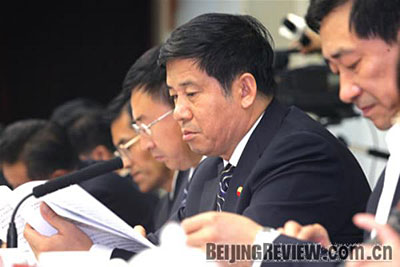| Imagine this: a six-storey office building allotted exclusively to a mere seven administrative cadres. But this is no joke. A poor, remote village in the Huangshan area of east China's Anhui Province holds the dubious distinction of housing this building.

In recent years, a rising trend of wasteful fiscal expenditure has provoked deep concern and dissatisfaction among the masses. Consequently, the issue of how to prevent and slash extravagant public expenditure became one of the most widely discussed issues among the deputies to the First Session of the 11th National People's Congress (NPC).
According to a report from the state-owned Xinhua News Agency on March 5, 2008, figures from the Ministry of Finance show that China's fiscal revenue in 2007 hit 5.13 trillion yuan ($733 billion), an increase of 1.25 trillion yuan, or 32.4 percent, year on year. Not surprisingly, administrative expenditure also skyrocketed, its growth rate surpassing that of fiscal revenue. This year's central fiscal budget report thus reiterated the need to prevent administrative waste and strictly control expenditure on staff, accommodation, vehicles, meetings and conferences -- expenses incurred by the government at all levels.
"Public expenditure is increasing drastically, and it is old news that the borderline between public and private expenditure has blurred," said Bing Zhigang, Finance Director of northeastern Liaoning Province and a delegate to the NPC, to Beijing Review. "This not only tarnishes the government's image but also puts fiscal revenue on edge if such an issue remains and worsens."
According to statistics, from 1978 to 2003 the total volume of China's fiscal expenditure increased by more than 20 times, and administrative expenditure multiplied more than 80 times in the same period, accounting for 20 percent of the total fiscal income.
The main reasons for the problem, according to Bing, are rooted in redundant staff and extreme wastefulness on entertainment expense, vehicle servicing and repair. Even the most conservative statistics show that government institutions in China will spend as much as 200 billion yuan (approximately $27 billion) each year purchasing, servicing and repairing vehicles, which some officials even appropriate for themselves. Naturally, this becomes a hotbed of corruption.
"It is imperative that, on the one hand, expenditure on public vehicles is cut; on the other hand, something must be done to promote and accelerate reforms which can be addressed through transportation allowance," Bing noted.
Moreover, group tours organized in the name of "overseas study" are responsible for a big chunk of public expenditure. According to this year's central fiscal budget report, a policy will be introduced to realize zero expenditure growth on overseas business trips for staff.
"It [touring abroad] is nothing new," said Bing. "The policy specifically aims to slash administrative waste. What's more, a strict administrative regulation should also be introduced to control people who are about to go on business trips abroad."
Although there have been several policies launched by the central government to curb increasing public expenditure, few have worked. The reason for this, according to Tang Xiuting, Director of the Development and Reform Commission of northeast China's Heilongjiang Province and a delegate to the NPC, rests with the absence of effective supervision.
Zhu Shugu, a commentator on current affairs, said that the NPC, the country's top legislative body, responsible for inquiring into governmental actions, should have more courage to question points of doubt in the government's fiscal budget report. | 